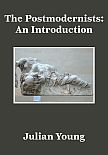The Postmodernists: An Introduction
Julian Young, a New Zealand philosopher, is W. R. Kenan Jr. Professor of Humanities Emeritus at Wake Forest University and Honorary Research Associate at the University of Auckland. His sixteen books have been translated into many languages. His Friedrich Nietzsche: A Philosophical Biography won the Association of American Publishers 2010 PROSE award for philosophy. Apart from postmodernism, his main interests are nineteenth- and twentieth-century German philosophy, the philosophy of art, religion, opera and tragedy, and the meaning of life.
 What is postmodern—postmodernism as philosophy—and what should we think of it? The first eight chapters of Julian Young’s new book examine the thought of key postmodernist philosophers: Lyotard, Deleuze, Foucault, Baudrillard, Derrida, Vattimo, Richard Rorty, and Judith Butler. In the final chapter, he turns to the question of what makes them all “postmodernists.” His conclusion is that postmodernism is best thought of as the combination of two elements: a “practical principle” and a “theoretical principle.” The practical principle is the claim that the Western ethical tradition is collapsing, and that since it is permeated by exclusionary and oppressive “binaries” that present white, heterosexual men as excellent human beings and everyone else as inferior, this is a good thing that we should further promote. The theoretical principle is the claim that there is no such thing as objective truth. Both principles, Young shows, are motivated by a radical political project: the abolition of the West as a cultural entity. But both propositions, he argues, are false. The practical principle is false because though the Western tradition is indeed fragmenting, this is a process we need to resist rather than encourage. The theoretical principle is false, among other reasons, because the postmodernists contradict themselves in multiple ways in asserting it. These conclusions matter, Young argues, because although academia lost interest in postmodernism at the end of the last century, it lives on as the ideology of the so-called social justice movement that has redefined what it means to be “on the left.”
What is postmodern—postmodernism as philosophy—and what should we think of it? The first eight chapters of Julian Young’s new book examine the thought of key postmodernist philosophers: Lyotard, Deleuze, Foucault, Baudrillard, Derrida, Vattimo, Richard Rorty, and Judith Butler. In the final chapter, he turns to the question of what makes them all “postmodernists.” His conclusion is that postmodernism is best thought of as the combination of two elements: a “practical principle” and a “theoretical principle.” The practical principle is the claim that the Western ethical tradition is collapsing, and that since it is permeated by exclusionary and oppressive “binaries” that present white, heterosexual men as excellent human beings and everyone else as inferior, this is a good thing that we should further promote. The theoretical principle is the claim that there is no such thing as objective truth. Both principles, Young shows, are motivated by a radical political project: the abolition of the West as a cultural entity. But both propositions, he argues, are false. The practical principle is false because though the Western tradition is indeed fragmenting, this is a process we need to resist rather than encourage. The theoretical principle is false, among other reasons, because the postmodernists contradict themselves in multiple ways in asserting it. These conclusions matter, Young argues, because although academia lost interest in postmodernism at the end of the last century, it lives on as the ideology of the so-called social justice movement that has redefined what it means to be “on the left.”
ACADEMICA PRESS
1727 Massachusetts Avenue, NW, Suite 507
Washington, DC 20036
academicapress.editorial@gmail.com
